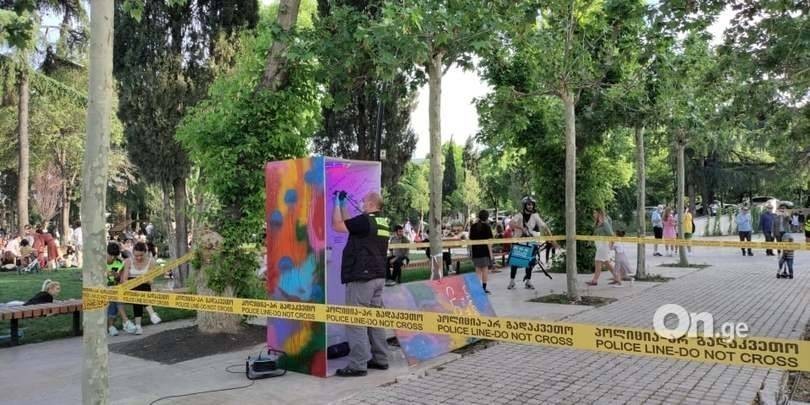საერთო ცხელი ხაზი +995 577 07 05 63


The Center for Social Justice responds to the fact that Guram Palavandishvili damaged the art installation "Welcome to the closet" staged by queer activists in Dedaena Park in Tbilisi on May 16, 2021, and calls on law enforcement agencies to respond promptly and effectively, as well as to take steps to prevent hate-motivated wrongdoings and hate crimes.
Queer activists built an art exhibit in Dedaena Park on May 16, 2021, to commemorate the week of the International Day Against Homophobia and Transphobia. Guram Palavandishvili, a member of the ultra-conservative and violent group, arrived on the scene shortly afterwards. He was aggressive and used threatening and insulting language against the queer activists there. He also violently damaged the art installation [1], however, despite numerous requests from the queer activists and the authors of the installation, there was no effective response from the police to the incident, Guram Palavandishvili was only evacuated, but was not detained.
Exercising the right to any public assembly, activity or expression of LGBTQ people in Georgia remains a significant problem, which is linked to the attempts of certain groups in the society to privatize public space. Negative experiences from 2012 and 2013 to protect freedom of assembly and expression have provoked violence in public space, which has also manifested itself in the failure of the state to ensure both a fundamental human right to freedom of expression and assembly and to punish those who violate that right. [2] As a result, May 17 (IDAHOT), as the International Day Against Homophobia, Transphobia and Biphobia, has become a day of display of the homophobic attitudes in institutions and society from year to year.
It should also be noted that despite numerous instances of public calls for violence by these groups, law enforcement agencies have not responded adequately to these actions. For example, during Tbilisi Pride Week in June 2019, Levan Vasadze, the former leader of the Ultra-Conservative and Violence Group and now the leader of the political party "Nation," issued a series of public violent statements against the Pride rally, including a public appeal for violence [3]. Namely, they announced the formation of "People's Legions" and patrolling the streets, but despite the fact that the Ministry of Internal Affairs formally investigated the incident [4], it has so far yielded no results [5], and Levan Vasadze was even given the opportunity to form a political party [6], through which he now spreads hatred from a new platform, aiming at dehumanizing queer groups. [7]
The incidents that occurred on November 8, 2019 in Tbilisi during the premiere of the film "And We Dance" [8] should also be addressed. Violent groups gathered in front of the theatre and openly confronted both moviegoers and police officers. On the ground, there were 27 administrative offenses, including an investigation into assault on police officers and damage to a police car; however, the state's inattention to violent group leaders' publicly threatening statements before the film premiere [9], urging their supporters to block the showing, must be viewed negatively.
These actions indicate the practice of mobilizing ultra-conservative and violent groups and the cultivation of homophobic and transphobic attitudes in society, which the state cannot counteract with effective preventive or punitive mechanisms. This in turn contributed to the strengthening of a culture of impunity. This process is part of the emerging anti-gender and ultra-right, violent sentiments in the world in recent years, whose aggressive rhetoric includes both religious, ethnic and political groups, as well as issues related to gender and sexuality. These groups recognize the superiority of some groups and oppose all steps that serve the integration and solidarity of minorities and other groups in specific countries. This poses several significant threats, including the rise of violent extremism and its spread at the national and governmental levels, which reduces the opportunities for democracy and peaceful coexistence.
The prevention of such violent groups and the violence provoked by them is an important foundation for the protection of human rights and the preservation of democracy. It goes beyond the strict framework of the security goal and relates to the analysis of development-related causes and locally relevant solutions. International experience in development programs and peacebuilding shows that the emergence of inclusion and tolerance in communities can contribute to better governance, diversity, and a society that is less vulnerable and more immune to violent extremism. [10] Adopting diversity, promoting tolerance and intercultural dialogue is also the 2030 Sustainable Development Goal (SDG 16), which aims to build a more peaceful, just and inclusive society.
The circumstances that contribute to the creation and empowerment of ultra-conservative violence groups are complex and, often, interrelated. They concern political, economic, historical, ideological and religious issues equally and, consequently, they affect communities, groups and individuals, both locally, and nationally or globally. [11] Therefore, the prevention of violent and deviant behaviors is becoming more and more important, which, in addition to police measures, should be based on interdisciplinary analysis, which, in addition to analyzing consequences, will also focus on the causes and risks/phases of its occurrence, in order to plan an effective, timely and early intervention.
Consequently, sustainable problem-solving approaches require an inclusive development approach to strengthen tolerance, political and economic empowerment, and reduce inequality through multilateral and interrelated strategies, namely:
Thus, we call on the relevant state agencies:
The website accessibility instruction